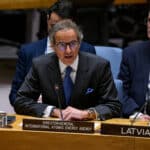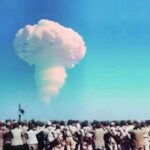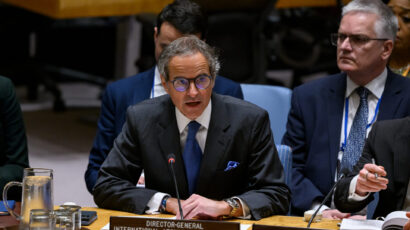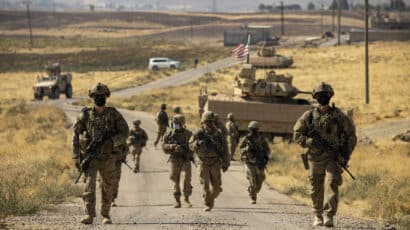After the Nuclear Posture Review: Obama’s disarming influence
By Scott D. Sagan | April 19, 2011
In his famous address in Prague two years ago this month, President Barack Obama promised to “reduce the role of nuclear weapons in our national security strategy,” and committed to making concrete progress toward “a world without nuclear weapons.” His critics derided this nuclear vision as a utopian fantasy, and claimed that US nuclear policy declarations were unlikely to have positive effects on other governments. But a careful analysis suggests otherwise.
A recent examination of key foreign governments’ responses to the Nuclear Posture Review — the official US government statement on the role of nuclear weapons in its deterrence and defense policy, released in April 2010 — showed that Obama’s policy significantly influenced a number of countries’ nuclear doctrines and diplomatic postures. Contrary to the critics’ belief, his review produced considerable progress toward a safer nuclear world. (This project, released in March 2011 as a special issue of The Nonproliferation Review, was conducted by 13 researchers from around the world, including myself.)
The new US nuclear posture. The 2010 Nuclear Posture Review assured nations lacking nuclear weapons that the US would not use nuclear arms against them, provided those nations remain “in compliance with their nuclear nonproliferation obligations.” It removed one whole class of nuclear weapons delivery systems — the nuclear-armed “Tomahawk” sea-launched land-attack cruise missile — from the arsenal; it called for further Russian and American nuclear arms reductions; and it promised that the US would only consider using nuclear weapons in response to nuclear attacks against the US or allied nations.
The international response. How did other nations respond to the new US posture? Russia’s nuclear doctrine, which was being rewritten to include prompt use of nuclear weapons in many regional and local conflict scenarios, was instead revised in the opposite direction — to include nuclear options only in response to attacks that “threaten the very existence of the state.” In addition, many of the NATO allies without nuclear weapons — such as Germany, Norway, and Belgium — were encouraged by the new US posture to push for the removal of the small number of “sub-strategic” or tactical nuclear bombs remaining on US bases inside NATO territories. At last year’s NATO summit in Lisbon, NATO governments agreed to address that concern by offering to negotiate with the Russian government for reductions or elimination of sub-strategic nuclear weapons in a future arms-control agreement.
Possibly the most important short-term success of Obama’s new nuclear-weapons policy was that it halted the erosion of the Nuclear Nonproliferation Treaty (NPT). At the 2005 NPT Review Conference, the treaty suffered a major setback when the international community failed to reach consensus on any new steps that could strengthen the nonproliferation regime — a failure that many nations blamed on the Bush administration’s displays of contempt toward multilateral negotiations, and toward the US NPT obligation to pursue “negotiations in good faith” on nuclear disarmament.
By contrast, at the May 2010 NPT Review Conference, the 189 signatories to the treaty welcomed “the reductions announced by some nuclear weapons states in the role of nuclear weapons in their security doctrines,” praised new and improved International Atomic Energy Agency safeguard inspection protocols, and underscored the importance of international discussions on multilateral control of sensitive nuclear fuel facilities. Harald Müller, a political scientist and member of the German delegation, reported that this modest, but valuable, outcome would not have been possible if not for Obama’s open embrace of the goal of a nuclear-free world, and the adoption of a nuclear posture that moved the US slowly toward that objective.
Sending a clear message. Now it is critical that the Obama administration maintain message discipline within the military and government bureaucracy. Some foreign governments, including India and China, still view the new US nuclear posture with skepticism, and its statements of reduced roles for nuclear weapons as mere rhetoric. Indeed, Chinese officials expressed concerns that conventional weaponry improvements might make the US more likely to threaten China in the future, and one Indian commentator called the new US doctrine “more posture than review.”
That kind of reaction is only encouraged when US officials stray from the president’s declared policy. Shortly after the NPR’s release, General Kevin Chilton, who was then Commander of United States Strategic Command, claimed that the US had not altered its longstanding policy of calculated ambiguity and that the president could simply change his declared policy. This statement implies a degree of flexibility that a military officer might want, but that the NPR explicitly constrains. Chilton also insisted that “future generations” will depend on nuclear weapons “for the deterrence and survival of the United States” — a phrasing that is deeply inconsistent with Obama’s stated goal of working toward a world free from nuclear weapons.
The next step. In the run-up to last year’s Senate ratification of New START, the Obama administration ordered major increases in funding for the nation’s nuclear weapons laboratories so that they can maintain the safety and reliability of the US nuclear arsenal without nuclear testing in the future. This program added credibility to Obama’s repeated statements that the US needs a nuclear deterrent as long as other states have nuclear weapons.
To further enhance the credibility of Obama’s pledge to work in good faith toward a world free of nuclear weapons, the administration should order additional reductions in US nuclear weapons beyond those required by the New START agreement. A bold but prudent step, building on last year’s retirement of all sea-launched nuclear cruise missiles, would be to now retire the air-launched nuclear cruise missiles maintained by the US Air Force.
It would be naive to think that Obama’s goal of a nuclear-weapons-free world can be reached easily or quickly. The president admitted as much when he first enunciated his vision in Prague. But it would be equally naive to think that the administration can simply rest on its arms-control laurels now. The new Nuclear Posture Review helped move the debate in many foreign governments in a positive direction, and created new opportunities for international cooperation in nonproliferation and disarmament. Seizing those opportunities will be the next challenge for Obama’s nuclear leadership.
Together, we make the world safer.
The Bulletin elevates expert voices above the noise. But as an independent nonprofit organization, our operations depend on the support of readers like you. Help us continue to deliver quality journalism that holds leaders accountable. Your support of our work at any level is important. In return, we promise our coverage will be understandable, influential, vigilant, solution-oriented, and fair-minded. Together we can make a difference.
Topics: Nuclear Weapons, Opinion















